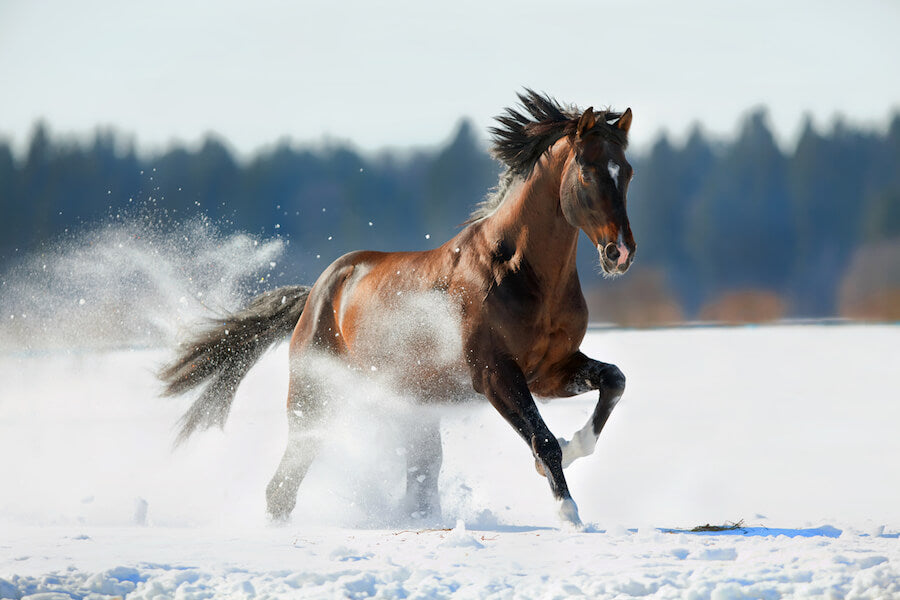Preparing your horse for winter
Owning a horse requires you to be prepared for a variety of situations and weather conditions. Making sure that your horse is ready for the winter is crucial to their well-being and happiness throughout this unpredictable season.
You will need to make sure that you and your horse are ready for a variety of conditions and temperatures depending on where you live. Having the proper gear and supplies can help keep your horse happy and healthy through the winter season and ensure that you can rest easy knowing that you are ready for whatever comes your way.
Let's look first and nourishing your horse through the winter months
First, you need to consider what your feeding. In the summer, your horse can graze in a pasture or eat grass hay and be perfectly fine, but the winter months bring cold temperatures and that means your horse will be expending more energy trying to keep their body temperature regulated.
Your horse's caloric needs increase during the colder months because it takes more energy to heat their body so make sure you use quality feed combined with grain to sustain warmth and maintain caloric intake.
You may also believe that with colder temperatures your horse won't be needing as much water, but this isn't the case. Water is important for digestion as well as staying hydrated in the winter months as well. A supply of (non-frozen) water, ideally above 45 degrees, will keep your horse hydrated and aid in digestion.
Something else to consider are healthy teeth. A healthy mouth and teeth allow your horse to drink and eat without discomfort. It’s wise to have an equine veterinarian check your horse’s teeth and mouth to ensure he can eat comfortably and maintain the right caloric intake for weight maintenance throughout winter.
Now what about keeping your horse warm and comfortable?
If possible, allow your horse’s coat to grow during the winter months. Its natural thickness provides your horse with the extra insulation needed to keep its body warm as the weather gets colder, as a layer of warm air is trapped below the surface.

There are times when you must clip your horse’s coat to keep them cool while working in the winter or in preparation for a show. For this reason, or because you’ve got an older horse, extra warmth can increase the horse’s comfort throughout winter. A waterproof, breathable blanket or coat will come in handy for days when your horse needs an extra layer to stay warm.
The warmest natural coat isn’t always enough to protect your horse from cold temperatures. A strong wind can cut right through it, and a wet coat can quickly lose its insulating ability. Provide your horse with shelter from wind, snow, and rain so it can enjoy pasture time and still have access to an area that will protect it from the elements.
And then there is the topic of riding in the winter
When riding your horse during the winter months, be careful to warm them up properly and ensure any sweaty areas are fully dried since this can cause the horse to later become chilled. Likewise, maintain care of horse riding tack and so that it doesn’t become cracked and dry from the cold air, causing it to become less effective.
Tending to your horses health
Consult with an equine veterinarian for wintertime parasite control. Once the first frost has occurred, you may want to give your horse something to kill bot larvae.
People and horses aren’t the only creatures that seek warm places in wintertime. Other pests are likely to find their way into the barn. Discourage and control pests by keeping food storage in sealed containers. Likewise, store blankets, leather products and other materials that could be used for nests in sealed storage spaces.
Good health is pivotal to staying comfortable and warm from the first frost until the temperatures begin to rise again. Part of your effort to maintain your horse’s health should include any necessary vaccinations as autumn transitions to winter.
Hoof growth occurs throughout the year so you must maintain hoof care year-round. Consider having your farrier use winter studs for traction and snowball pads to keep snow from accumulating inside the bottom of the hoof.
And last but not least, barn and tack room organization
Make it easy to access everything you need throughout the winter months by putting away the seasonal items you won’t need again until spring. By organizing your barn storage space, you can avoid wasting time searching for supplies and spend it grooming or caring for your horse. In conjunction with preparing your horse for winter, you can also be prepared by getting organized and ready to spend quality time with your equine friend this winter.

